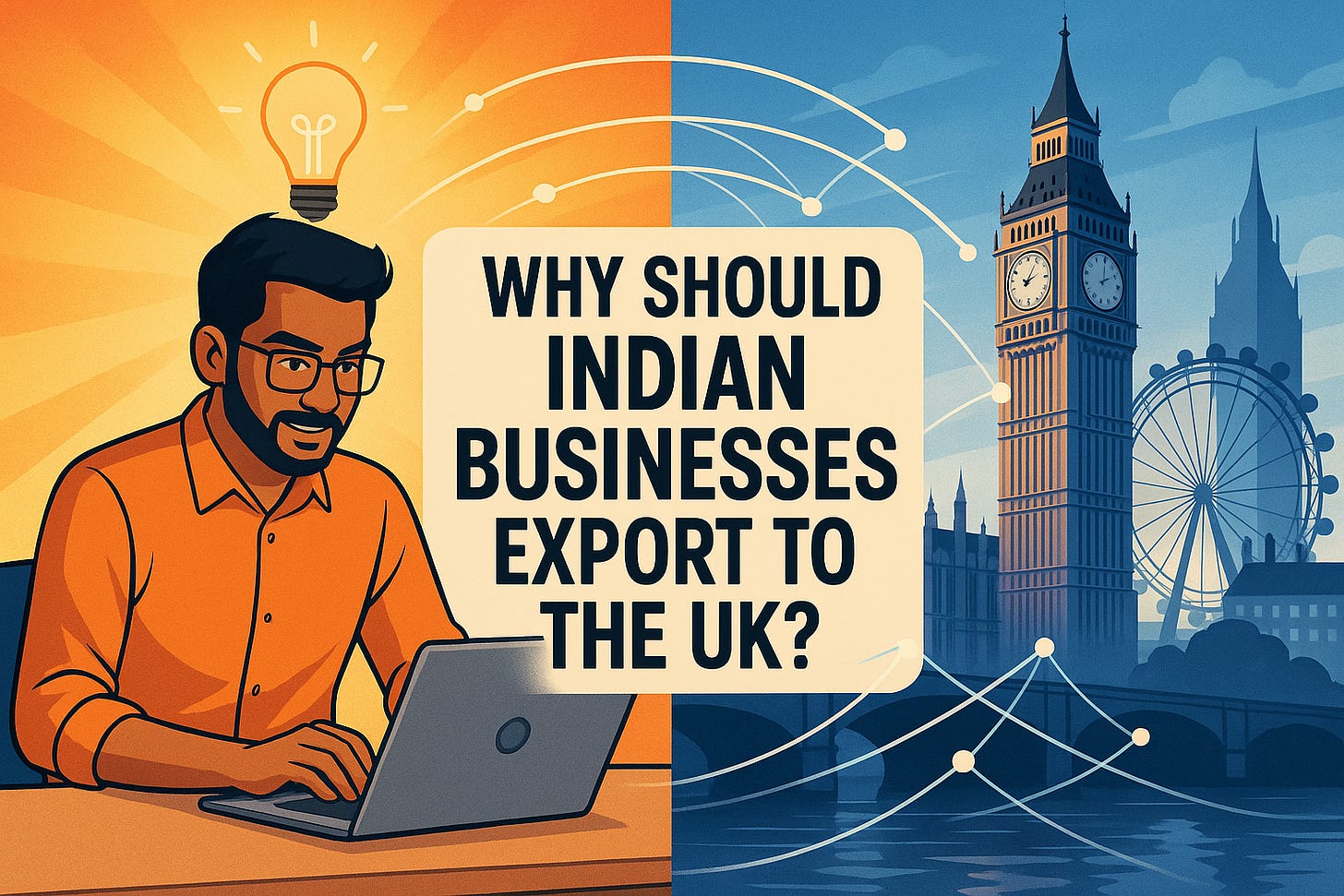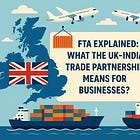Why Should Indian Businesses Export to the UK?
Every Indian business dreams of going global someday. And for many, that first big leap often starts with the UK- a market that truly values quality, trust, and good stories.
This article is authored by Commenda, the trusted partner for global expansion. It provides a single platform and expert support in market access, tax, and compliance.
When Indian businesses look beyond borders, the UK often feels like one of the most promising yet demanding destinations. It’s a market where heritage brands sit proudly on high streets, consumers value trust as much as price, and even everyday purchases carry a sense of discernment.
Unlike price-sensitive markets, the UK rewards consistency, quality, and brand reputation- traits that transform companies into long-term household names.
For Indian exporters, this presents a double-edged opportunity. On one hand, entering the UK market signals credibility on the world stage- winning here often opens doors across Europe and beyond. On the other hand, it’s not a market where shortcuts work. British consumers are brand-conscious, expect compliance with strict regulations, and are quick to switch if value doesn’t match the promise.
This unique mix makes the UK both aspirational and challenging. Today’s article explores why the UK continues to hold this premium reputation, what it really means for Indian businesses, and the strategies that can help them enter and thrive in this demanding market.
Trends Defining the UK Market
The UK’s reputation as a premium market is rooted in how people buy and what they expect from the products they choose.
Factors that shape the UK market include:
High purchasing power. Substantial per capita income and a mature consumer base, particularly in London and other major cities, support steady demand for quality goods and services.
Cultural preference for quality. Shoppers have a long tradition of valuing heritage, craftsmanship, and trusted brands, often paying more for products they believe will last or deliver a better experience.
Developed retail ecosystem. A well-established network of online and offline retailers gives products visibility to both domestic and international customers.
Rigorous standards. Rules around food safety, pharmaceuticals, and sustainability keep the focus on quality and require exporters to demonstrate compliance.
Changing consumer preferences. Shoppers are increasingly drawn to sustainability, ethical sourcing, and authenticity in brand stories.
Sector examples. Areas like organic foods, artisanal beverages, luxury goods, and design-led products show that shoppers consistently reward producers who deliver on quality.
Opportunities for Indian Exporters in the UK
The premium qualities of the UK market shape not only how consumers buy but also where the best prospects lie for exporters.
For Indian businesses, several areas stand out:
Premium segments. Textiles and fashion, speciality foods, technology, fintech, and wellness all have established demand where Indian firms can compete on quality as well as innovation.
Niche categories. Ayurvedic and organic wellness products, alongside IT services that carry internationally recognised certifications, can resonate strongly with UK buyers looking for authenticity and assurance.
Success in the UK carries weight beyond its borders. Products that gain traction in this market often earn credibility that supports entry into broader European and global markets.
Also, recent provisions under the UK-India Comprehensive Economic and Trade Agreement reduce tariffs and simplify access for exporters, making it easier for Indian companies to bring premium offerings to the UK.
Key Challenges When Entering the UK Market
The UK offers opportunities, but it also presents hurdles that businesses need to plan for:
Regulatory compliance. The UK maintains strict product and service standards across industries. Meeting these requirements can demand significant investment in certification, testing, and ongoing quality assurance.
Brand positioning. With a crowded marketplace and highly brand-conscious consumers, exporters must go beyond price. Building trust through clarity, authenticity, and strong storytelling is equally essential.
Operational costs. Higher expenses for distribution, marketing, and local operations, combined with currency fluctuations, can pressure margins if not managed carefully.
The UK market may be demanding, but the opportunities far outweigh the challenges. Businesses that prepare well, understand consumer expectations, and focus on quality can thrive in the UK market.
How to build a Successful UK Market Presence?
Indian exporters that focus on a few key areas are better positioned to turn opportunities into real growth:
Invest in compliance and certifications: UK consumers and regulators expect top-notch standards, whether it’s food safety, sustainability, or product quality. Businesses that secure recognised certifications and maintain transparency win credibility faster. Compliance tools can make the process smoother and less daunting from day one.
Build strong partnerships: Collaborating with distributors and retailers who know the local market gives you valuable insights and connects you to established customer networks. These relationships reduce risks and help your brand gain traction faster.
Position your offerings as premium: The UK market rarely rewards competing on price alone. Brands that tell compelling stories, showcase quality, and present themselves as premium stand out in a crowded marketplace.
Leverage digital trade and payments: Modern tools make cross-border business run more efficiently. Digital solutions for payments and trade transactions simplify settlements, manage currency fluctuations, and ensure faster, reliable cash flows.
Success in the UK isn’t instant. It comes to those who play the long game, focus on quality, and invest in building trust.
Final Thoughts
The UK is a premium marketplace where quality, trust, and authenticity matter more than the lowest price.
Yes, there are challenges. Regulatory compliance, higher operating costs, and a market that carefully evaluates every brand can feel intimidating. However, these hurdles are what give the UK its credibility and influence. They separate fleeting players from businesses that can build lasting presence and reputation.
At the same time, supportive measures under the UK–India Comprehensive Economic and Trade Agreement are making it easier for Indian exporters to navigate these barriers and find their footing.
If you’re ready to explore opportunities in the UK, now is the time to start planning, aligning with market expectations, and positioning your brand for long-term success.






